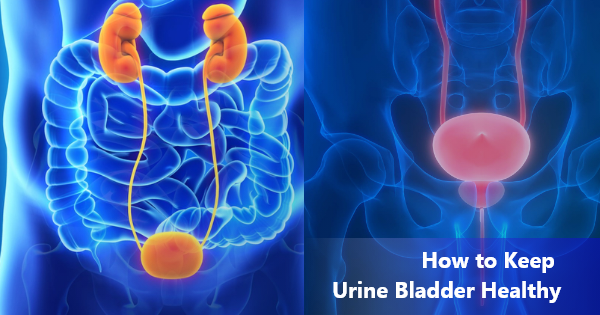Maintaining a healthy urinary bladder involves a combination of lifestyle choices, dietary habits, and hygiene practices. Here are some tips to help you keep your urine bladder healthy:
Stay Hydrated: Drink an adequate amount of water throughout the day. Hydration helps flush out toxins and keeps the bladder functioning properly. Aim for at least 8 glasses (about 2 liters) of water daily, but individual needs may vary.
Practice Good Hygiene:
Wipe Properly: After using the toilet, wipe from front to back to prevent the spread of bacteria from the anal area to the urethra.
Cleanliness: Maintain proper genital hygiene to prevent bacterial growth and infections.
Urinate Regularly: Avoid holding in urine for extended periods. Urinating when you feel the urge helps prevent urinary tract infections (UTIs) and other bladder issues.
Empty the Bladder Completely: Make sure to empty your bladder fully during each bathroom trip to reduce the risk of urine retention and infection.
Cranberry Juice: Consuming unsweetened cranberry juice or cranberry supplements may help prevent urinary tract infections by reducing the adhesion of bacteria to the bladder walls.
Maintain a Healthy Diet:
Avoid Irritants: Limit or avoid foods and drinks that can irritate the bladder, such as caffeine, alcohol, spicy foods, and acidic beverages.
Fiber-Rich Diet: A diet high in fiber can help prevent constipation, which can put pressure on the bladder and lead to issues.
Kegel Exercises: Strengthening the pelvic floor muscles through Kegel exercises can help maintain bladder control and prevent urinary leakage.
Maintain a Healthy Weight: Excess weight can put pressure on the bladder and increase the risk of urinary incontinence. Maintain a healthy weight through a balanced diet and regular exercise.
Avoid Smoking: Smoking is linked to a higher risk of bladder cancer and other bladder-related issues. Quitting smoking can benefit your overall bladder health.
Regular Physical Activity: Engage in regular exercise to improve circulation and promote overall urinary and bladder health.
Limit Alcohol and Caffeine: Both alcohol and caffeine can irritate the bladder and increase the frequency of urination. Limit your intake, especially before bedtime.
Manage Chronic Conditions: If you have diabetes, hypertension, or other chronic conditions, manage them effectively as they can impact bladder health.
Medical Check-ups: Regularly visit your healthcare provider for check-ups and screenings. Address any urinary issues promptly.
Practice Safe Sex: Use protection during sexual activity to reduce the risk of urinary tract infections and other sexually transmitted infections.
Remember that individual needs and circumstances vary. If you experience persistent urinary symptoms, discomfort, or changes in bladder habits, consult a healthcare professional for proper evaluation and guidance.
Tips to Keep Your Bladder Healthy:
Stay Hydrated: Drink plenty of water throughout the day to help flush out toxins and maintain bladder health.
Practice Good Hygiene: Maintain proper genital hygiene and wipe from front to back after using the toilet.
Urinate Regularly: Don’t hold in urine for extended periods; empty your bladder when you feel the urge.
Cranberry Products: Consider consuming unsweetened cranberry juice or supplements to potentially prevent urinary tract infections.
Healthy Diet: Eat a balanced diet rich in fiber and avoid bladder irritants like caffeine, alcohol, and spicy foods.
Kegel Exercises: Strengthen pelvic floor muscles through Kegel exercises to enhance bladder control.
Maintain a Healthy Weight: Manage weight to prevent excess pressure on the bladder.
Avoid Smoking: Quit smoking to reduce the risk of bladder cancer and other bladder-related issues.
Regular Physical Activity: Engage in regular exercise to promote circulation and overall bladder health.
Limit Alcohol and Caffeine: Reduce alcohol and caffeine intake, especially before bedtime.
Manage Chronic Conditions: Properly manage conditions like diabetes and hypertension that can impact bladder health.
Safe Sex: Practice safe sex to prevent urinary tract infections and other infections.
Frequently Asked Questions (FAQs) about Bladder Health:
Q: How much water should I drink daily for bladder health?
A: Aim for about 8 glasses (approximately 2 liters) of water per day, but individual needs vary.
Q: Can holding in urine lead to bladder problems?
A: Yes, holding in urine for prolonged periods can weaken the bladder muscles and increase the risk of infections.
Q: Does cranberry juice prevent UTIs?
A: Unsweetened cranberry juice or supplements may help prevent urinary tract infections by reducing bacteria adhesion to the bladder walls.
Q: What foods irritate the bladder?
A: Some common bladder irritants include caffeine, alcohol, citrus fruits, spicy foods, and artificial sweeteners.
Q: Can Kegel exercises improve bladder control?
A: Yes, Kegel exercises can strengthen pelvic floor muscles and improve bladder control.
Q: Does smoking affect bladder health?
A: Yes, smoking is linked to a higher risk of bladder cancer and other bladder-related issues.
Q: Can exercise impact bladder health?
A: Regular exercise can promote circulation and overall bladder health. However, high-impact activities may temporarily increase bladder pressure.
Q: How does diabetes affect the bladder?
A: Diabetes can lead to nerve damage that affects bladder function and increase the risk of urinary tract infections.
Q: Can I prevent UTIs through hygiene?
A: Proper genital hygiene and wiping from front to back after using the toilet can help prevent urinary tract infections.
Q: When should I see a doctor for bladder issues?
A: If you experience persistent urinary symptoms, discomfort, pain, changes in urine color, or blood in urine, consult a healthcare professional.
Remember, maintaining a healthy lifestyle, proper hygiene, and seeking medical advice when needed are essential for promoting bladder health.





